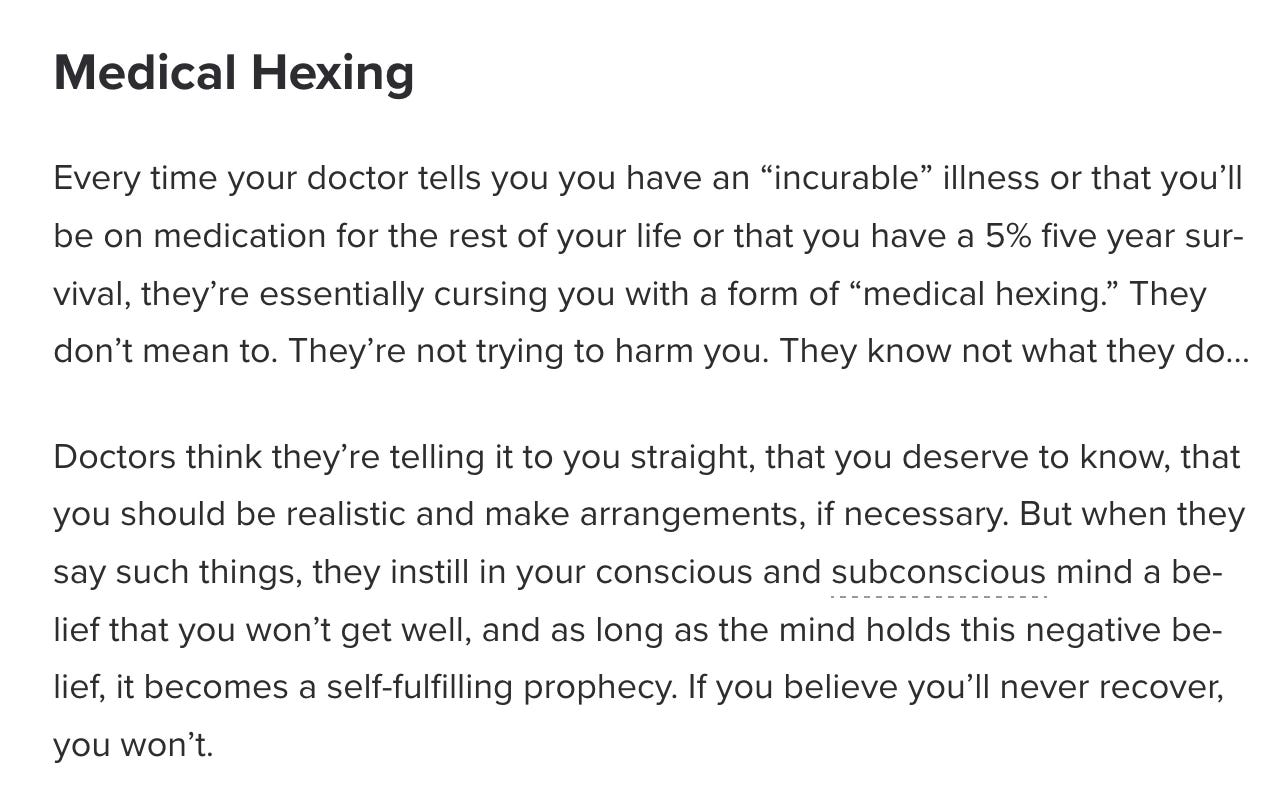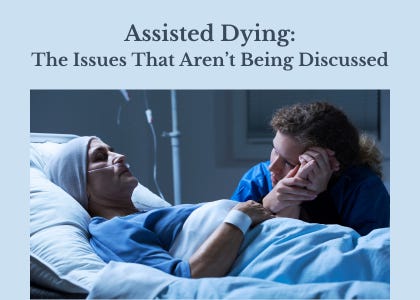Assisted Dying Part 3:
A Real Palliative Care System?
On Friday 20th June 2025, which, at the time of writing, is tomorrow, MPs will vote on the next stage of the Assisted Dying bill for England and Wales.
There is much debate about the provisions of this bill, many of which have already been amended since the introduction of and first vote on the bill in November 2024. The main focus of these debates is whether the provisions are adequate to provide the safeguards deemed necessary to protect vulnerable people.
Another key aspect of the debate is that too little attention is being paid to palliative care.
These arguments are articulated clearly and passionately in the documentary linked below - although in my opinion they do not go far enough, as I will explain.
Whilst I agree with many of the concerns expressed in the documentary, they do not include what I feel are some the most fundamental issues, which I’ve discussed in my previous articles - links to these are provided below - but will outline again in this article.
The main alternative suggested by the opponents of the bill is palliative care or, to be more precise, expansion of and improvements to existing palliative care facilities. However, palliative care can only be truly effective if it is based on a genuine understanding of the patient’s condition and therefore able to address the underlying causes of that condition.
But this not how the mainstream medical system known as ‘modern medicine’ is practised. And it will be physicians trained under that mainstream medical system who will be advising the palliative care facilities of the patients’ diagnoses and their potential treatments.
The recommended protocols within this ‘system’ involve providing treatments that are claimed to be able to relieve symptoms on the basis that the cessation of symptoms equates to the cessation of the ‘disease’. But this does not reflect how the body actually works, which is why treatments are rarely effective at achieving a complete cessation of the condition or ‘cure’, even if temporary relief of symptoms may occur.
The kinds of chronic conditions with which people will be diagnosed and then recommended palliative care are claimed to be ‘incurable’, which means that the medical system does not know how to effect a cessation of these conditions. What I discovered in the course of my research is that these conditions are admitted to be poorly understood, as described in great detail in What Really Makes You Ill?
The vast majority, if not all ‘treatments’ involve what are termed ‘side effects’, but this is a misnomer; any additional subsequent effects are almost certainly direct effects of the treatment, because they probably would not have occurred had the ‘treatment’ not been administered. Furthermore, these ‘side effects’ are invariably ‘treated’ with further ‘medicines’, which are usually themselves accompanied by further ‘side effects’ and so the cycle of dependency continues, leading to an ever-greater number of ‘medications’, also known as poly-pharmacy.
This is not ‘healthcare’ - this is merely ‘disease management’.
The lack of effectiveness of treatments in providing a permanent ‘cure’ for patients results in the current notion that people have to ‘live with’ their condition and receive treatment for the rest of their lives. This is, of course, highly lucrative from the perspective of the pharmaceutical industry because it creates permanent customers for their products.
But, in addition, it also creates a population of people who are far from healthy - and this may be at the heart of the introduction of the assisted dying legislation - because the ‘would-be controllers’ have realised that there is an increasing percentage of less-than-healthy people in the vast majority of countries across the world. One of the reasons for the obvious increase in poor health everywhere will include the increased rollout of vaccinations of all types, not just the one for so-called ‘Covid’, all of which are harmful to health; vaccinations have never been proven to be either safe or effective.
At the same time, I am perfectly aware that some people do have certain conditions or disabilities that cannot easily be alleviated or reversed, if at all. But even these need to be viewed from a different perspective than the one currently used by ‘modern medicine’.
From my many years of research, which is still ongoing, I have discovered that there is a variety of factors that play a role in our health and that these factors are not restricted to ‘physical ones’; they also include mental/emotional/psychological factors that are rarely, if ever, considered by the mainstream system, except within a very limited perspective.
Please note that I am not referring to ‘mental health’ in the way it is referred to by the mainstream, but to the state of our thoughts, beliefs, ideas and fears etc., all of which are based on the experiences we have had throughout our lives. These experiences can impact how we view life, which, in turn, affects our ideas, beliefs and expectations and consequently our behaviours and the actions we take.
What I’m highlighting here is the power of the mind to actually manifest certain conditions within the body. This may sound ‘woo woo’, but I can assure you it isn’t; it is based on the very well-known phenomenon of the ‘placebo effect’ and its opposite, the lesser-known phenomenon of the ‘nocebo effect’.
In my first article on the topic of assisted dying, I shared an article by Dr Lissa Rankin, entitled The Nocebo Effect: Negative Thoughts Can Harm Your Health in which she states,
“The placebo effect is real, it works about 18-80% of the time, and it’s not just in your head…”
She also added the following comment under the heading Medical Hexing, which for me is, or ought to be, one of the most important components of the debates on assisted dying because one of the main criteria states that a patient has been diagnosed with a ‘terminal illness’.
The reason this is so important is that people need to be aware that any prognosis by a physician can in fact become a self-fulfilling prophecy, but not because the doctor is ‘right’, but because the patient has believed the doctor and has the ability to manifest the stated prognosis as their real lived experience. Many people have been documented as dying in accordance with the physician’s prognosis.
By comparison, there are many people who chose not to believe the prognosis offered to them and instead chose to live. Some people have been documented as having lived many years beyond the original timescale proposed (or should that be ‘imposed’) by the physician.
This strongly indicates that ‘end-of-life’ care needs to reassessed and aligned with the true understanding of how the mind and body work together.
I’m not denying that, in some cases, people may indeed be close to the end of their life. I’m not claiming that everyone ‘can be saved’ - that is definitely not the message here.
What I am pointing out is that there is much more that needs to be included in any palliative care facility.
Furthermore, my emphasis is not on the parliamentary system and efforts to persuade MPs about how to vote, because I do not believe that a true healthcare system will be or even can be provided by any government or mainstream organisation that is based on the idea of providing a ‘pill for each ill’ or the surgical removal of offending organs.
And this is why I write.
My aim is to inform - so that ‘the people’ can set up the appropriate facilities from the basis of a true understanding of how the body works and of the power of the mind, in order to help others who may need care at the end of their lives.
Dawn 🌹
Resources:
What Really Makes You Ill? Book
Assisted Dying:
I was initially reluctant to tackle this topic because it is so sensitive. However, as with most ‘health issues’, the mainstream media reporting fails to cover all the salient points, so I feel it’s …
Assisted Dying:
In my first article on the topic, I wrote that there may be issues involved other than the ones I discussed. The response I received from that article inspired me, despite my initial reluctance to ta…





Another clear, concise and logical article. Thank you Dawn 🙏
Hexing and the nocebo effect can begin when, during a 'routine' exam a doctor recommends further test procedures (i.e. more lubricant for the medical machine), indicating a concern regarding cancer or any other dis-ease. Tom Cowan uses the term "bone pointing". It is absolutely real and I've witnessed many times the elevated anxiety in the unfortunate patient. I wish whole-heartedly that I could affect some spiritual and mental wisdom in those about whom I care deeply and personally. But they look to their allopathic medical priests for ultimate guidance. As a friend, who is facing a cancer diagnosis, said to me recently: "Well, I don't know about all this (the body, the mind, the spirit and the dangers of allopathy) so I'm gonna trust the doctor." Meaning it's just too difficult for (him) to consider, even if it is a matter of unnecessary suffering and an ultimate death sentence.
I understand the attitude and submission of those like my friend. I've been there in one way or another on many issues. But my urgings and pointings-out of reasons to not abandon one's self to those who exhibit and practice no real care have never made any difference that I can detect. Conversely, my efforts seem to make them extremely uncomfortable. When they consider allopathy to be the god of health then I come off as lunatic heretic, no matter how calm and reasoned I am with presenting facts. Over the years I seen my father, husband, siblings and many other relatives and friends languish and die in the gears of the machine. And one of those opted for active suicide. But when no questions are asked and being open to alternative information is"too hard", then I my only option is to continue loving, grieve as I must, and accept that this is their decision, informed or not.
I send much gratitude to you, Dawn, for your forthright addresses, fortitude and genuine caring.